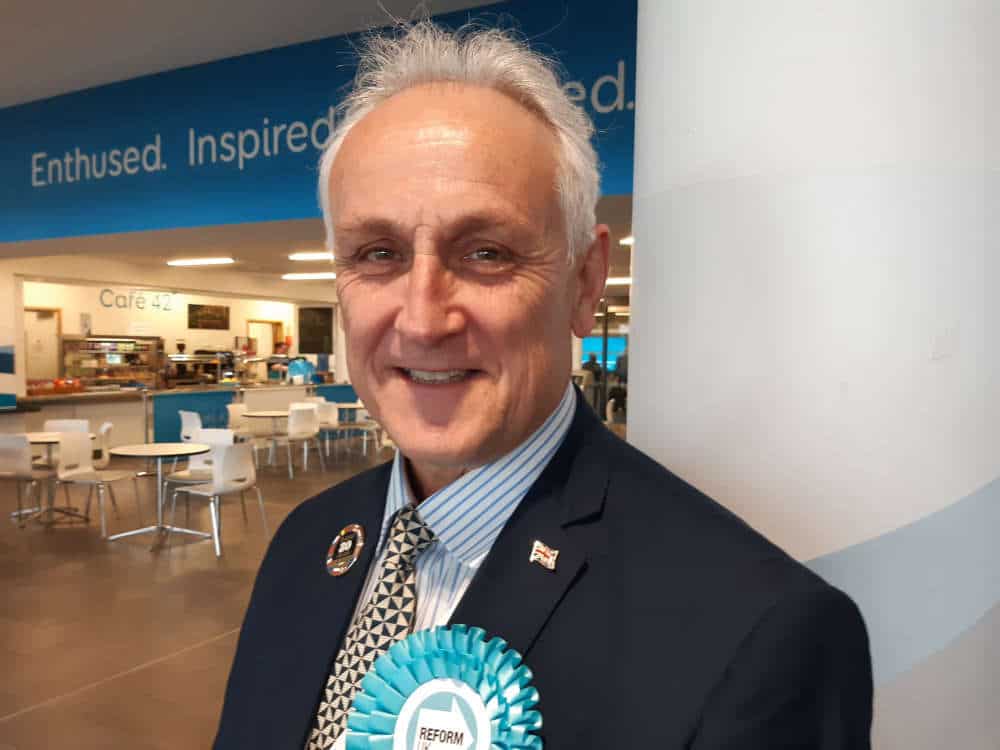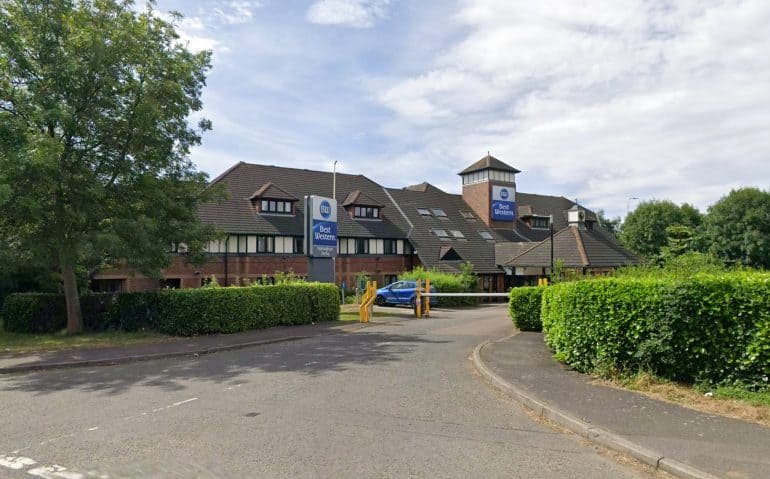-
 play_arrow
play_arrow
Erewash Sound Love Music - Love Erewash
-
 play_arrow
play_arrow
Living with Functional Neurological Disorder for 10 years - Liam Virgo Erewash Sound
Derbyshire council insists it needs to be ‘at the table’ to influence planned Local Government changes
today16 July 2025 5

Derbyshire County Council has voted by a majority to agree in principle to opt for a new two-layer authority with a north and south split under Government reorganisation plans for Local Government arguing the importance of being ‘at the table’ to influence the process.
The Reform UK controlled council’s latest position on the Labour Government’s plans to introduce single, unitary authorities in counties by scrapping councils in two-tier areas like Derbyshire, which has county and then district and borough authorities, has been met with criticism from some opposition councillors.
But Council Leader Alan Graves told a recent Full Council meeting that it was important to be able to engage in the process and the authority’s latest proposal would allow the council to influence on-going decision-making with the Government.
Cllr Graves told the meeting: “This is a once in a lifetime opportunity to simplify the current system and make it more efficient and effective.
“Our own residents will benefit from a single point of contact rather than trying to understand whether their issue should be directed to us in the county or to their local district or borough council and that alone makes the exercise more worthwhile.”
The Labour Government’s Local Government Reorganisation White Paper proposals include potentially setting up single, unitary authorities across England with an elected mayor in counties by merging or scrapping councils in two-tier authority areas like Derbyshire that operate county, and then district and borough councils.
But Derbyshire County Council has now joined the county”s eight district and borough councils, and Derby City Council with a similar proposal for the Government to consider implementing two separate north and south councils for the county.
The city, borough and district councils have argued that one unitary authority for Derbyshire will not work because of the size of the county but a system with a north council and a south council operation will maintain the historic areas of the county and provide better opportunities to work in partnerships especially with the East Midlands Combined County Authority.
They have also argued one, single unitary authority would create an inefficient delivery of services, would stifle economic and housing growth and create a disparity between Derbyshire and Derby in terms of population and tax base.
Three options under the ‘One Derbyshire, two councils’ proposal include placing Amber Valley Borough Council entirely in the northern council, or entirely in the southern council, or to accommodate different parishes joining each of the two councils depending on where they may best fit.
But during the county council’s Full Council meeting on July 9 some opposition councillors raised concerns that the county council’s LGR plans could harm more rural areas like the Derbyshire Dales and towns like Ashbourne that could end up being left behind and banded into the Derby City area.
Conservative Cllr Nigel Gourlay fears Ashbourne could be ripped out of the Derbyshire Dales and Cllr Steve Bull argued that Ashbourne residents do not want the town to be considered as a suburb of Derby.
Conservative Cllr Wayne Major also raised concerns that market towns and villages have different needs and he questioned how services would be split across the north and south under LGR while Conservative Cllr Alex Dale accused the council of pursuing a Derby-centric model.
Other councillors including Independent Amy Wheelton claimed LGR will take power away from local people and even Reform UK’s Joseph Turrell argued the system will take away a lot of local decision-making power but he fears the council’s hands are tied because councils are having to respond to a Government plan.
Green Cllr Rachael Hatchett also said that any plans or desire to split the Derbyshire Dales and the Amber Valley is not something reflected by the feelings of those in these two districts.
Liberal Democrat Cllr Town Snowdon said: “The proposals are not devolution. It’s a con by the Labour Government to try and consolidate, influence and get some savings out of Local Government. The plans they have got will not save money. It will just spend money on a reorganisation that the electorate do not want. It makes democracy less, it moves accountability away from the electorate and centralises influence and control.
“It’s not devolution as we understand it. The Liberal Democrats in Chesterfield, who form the opposition to the Labour council there, voted against the proposal brought forward by district and borough councils on the basis that it’s not devolution and we are totally against this unwanted reorganisation of Local Government.”
Cllr Snowdon added: “It’s not appropriate and it’s a waste of time and a waste of money and as such I certainly won’t be voting to support this.”
Reform UK Cllr Stephen Reed argued there is a danger LGR could be ‘dictated to’ the council from the Government or the county council can ‘come to the table’ and guide the final decision. He said: “Derbyshire isn’t changing as a county in terms of it is still going to be one body. We are not selling off Erewash to Nottinghamshire, we are not selling off Amber Valley or High Peak or whatever else to Manchester. It’s still staying in its ‘identity’ and culture as Derbyshire.
“There are some very real challenges we are going to have to have but as a county council we need to lead the charge, we need to be at the table saying what is the best result for residents.”
The Government has argued that LGR plans will include elected mayors with more powers on planning and transport, and that the changes will create savings, create greater efficiency, improve public services, and support economic growth.
But critics are concerned about the loss of district and borough councils, a risk of greater Government control, the removal of local decision-making, tax increases, powers being taken away from communities and some also doubt the plans will create savings.
Cllr Graves said: “All I can say to members of this chamber is we can either engage with the process and we can engage with the decision-making we make or we can say I am not going to do it – sod off! – And if that is what you want to do, that’s entirely up to you. That’s your choice.
“I do not want it any more than anybody else wants. I was quite happy to carry on as we are but LGR will come and we can either go with it or fight against it.”
The council formally voted by a majority on July 9th to agree in principle to its preferred option and to work with other Derbyshire councils while acknowledging the Government’s preference for a single submission, and to note Government grant funding to support preparations and to commence with public engagement on LGR while discussions continue.
Supporters of LGR suggest that a new structure of Local Government in Derbyshire could save between £56m and £93m over five years through reduced duplication of services, fewer council buildings, fewer councillors and senior officers, and being able to achieve better economies of scale when buying and delivering services.
The views of people and organisations will feed into final proposals which must be considered by councils and submitted to the Government by November 28th.
The Government will review the proposals for Derbyshire, and for twenty other county areas across England, before making final decisions in the summer of 2026.
If the Government accepts the proposals for Derbyshire, elections for the new shadow authorities are expected to take place in May, 2027, and new councils could be operating by April 1st, 2028.

Written by: Erewash Sound
Similar posts
Sponsors
ON AIR
SEARCH
CATEGORIES
RECENT POSTS

‘Sticking plaster’ support plan for pubs neglects other sectors says Chamber

Are you a member of the Ockbrook School Alumni?

Derby adult club saved from closure after crunch meeting

Derbyshire County Council drops core net zero commitment, shifting towards economic benefits and production

Erewash Sound and The Crockers DJs present ‘Decades of Dance’ – Saturday 4th April
103.5 & 96.8 FM
LOVE MUSIC
LOVE EREWASH
Office: 0115 888 0968
Studio: 0115 930 3450
Erewash Sound, The Media Centre, 37 Vernon Street, Ilkeston, DE7 8PD
© Copyright 2026 Erewash Sound CIC. All Rights Reserved. Company Number 6658171.






